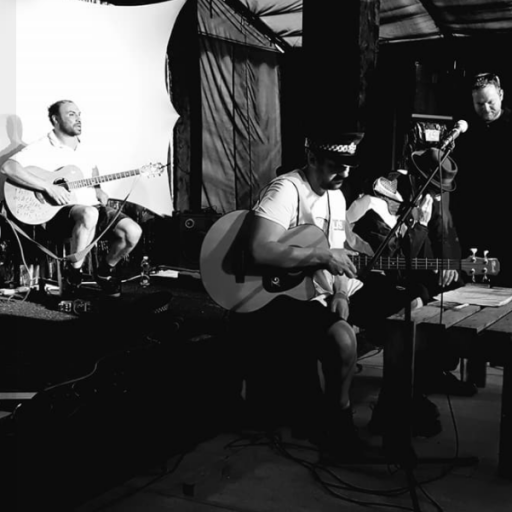An Interview with The Healthy Oyster Collective
The world is going politics crazy, upon which wave is surfing the magnificent theatrical nous of The Healthy Oyster Collective. The Mumble were delighted to catch them for a wee blether…
Hello Eric, so where ya from & where ya at, geographically speaking?
Eric: I was raised in Southern California, then I was in New England for college. I moved to New York City afterwards, and I now am pursuing my masters degree in Iowa. So, all over the U.S.
Hello Lila, so where ya from & where ya at, geographically speaking?
Lila: Hiya! I’m grew up Washington DC, New York City is home, and I’m in a masters program right now in Iowa. So I guess you could say I’m an East Coast gal in an Iowa body, at the moment.
When did you first develop a passion for performance art?
Lila: All my friends were auditioning for Seussical the Musical in middle school, so I tagged along so as to not be left behind. I was cast in the chorus of inanimate objects where they put all of the kids who were passionate but not talented. The feeling of performing was addictive!
What for you makes a good piece of theatre?
Eric: I don’t know if I can pinpoint what exactly is in a good piece of theatre. I think theatre that excites me, across many forms and styles, is work created from a sense of unknowingness, where the creators don’t begin with a predetermined notion about how to make the piece “work.” I think naïvetée is under appreciated as a process tool.
You’ve got three famous figures from history coming round for dinner. Who would they be & what would you cook; starter, mains & dessert?
Eric: I’d invite over three famous anti-Semites: Richard Wagner, Henry Ford, and Pope Urban II (who called for the First Crusade). I would then make them sit through a full Passover Seder. There would eventually be gefilte fish, brisket, and kugel, but first they’d have to sit through an eight hour service. Call it dinner party revenge.
How did you get into directing?
Lila: beloved professor in university convinced me that I didn’t actually want to perform, I wanted to direct. (I sat in his office to discuss my work in acting class, and tearfully told him “I know what I want it to look like, I just don’t want to do it!”) The next semester, I directed Sophie Treadwell’s Machinal and thought, “Yeah, he’s right.”
Can you tell us about The Healthy Oyster Collective?
Eric: The Healthy Oyster Collective a group of theater artists who create socially conscious works in theatrically playful forms. We’ve been around five years, and we’ve created three full length works – If the Saints Arrive in Germany, Kingdom Crosses Over, and Pastoral Play. bad things happen here is our first project we’re producing outside of the U.S.

Your subject matter is often politically-hewn, where does the compulsion come from?
Lila: I grew up in an activist family, so politics were everywhere. We discussed elections and strategy for getting environmental legislation through Congress around the dinner table. I was encouraged to read the newspapers strewn all over the house. In DC, people talk about politics like people elsewhere talk about sports–it’s all-consuming. So that’s really the lens I bring to all of my work: how does this play plug into the larger world and its power structures?
Your plays have been shown all across the North American continent – are you excited about the appearance of your work in Edinburgh?
Eric: I’m very excited. I’m looking forward to seeing how my work functions in the U.K., what audiences here latch onto that U.S. audiences ignored, what seems superfluous here that to U.S. audiences seemed essential. It’ll be a radically different audience to be in conversation with; I’m curious to see what that conversation looks like.

This year you are directing bad things happen here at the Fringe. Can you tell us about it?
Lila: bad things happen here is a tour of a fascist state loosely based on the Argentine Dirty War. (And, increasingly, on the present-day USA.) Our tour guides are two women, who play 40 different characters between them as they take us through the lives of people of various classes, ages, and political allegiances living under this regime. Unlike many pieces about violent regimes, bad things happen here focuses not on rebels or state agents, but on everyday folks just trying to get through the day alive. Eric has also done a beautiful job focusing on the linguistic changes that accompany fascism–what’s unsaid is as important as what’s said.
How does this play grapple with the current world of Trump and Brexit?
Eric: bad things happen here is an examination of nationalism run rampant, and how that intersects with issues of class, misogyny, and language. I’m interested in how nationalistic rhetoric infects our everyday speech, how words lose and gain new meanings during times of political chaos. Trump, and Brexit, thrive on linguistic corruption and lies passed off as truth – who is considered a “citizen,” what we mean by a “nation.” We’re living in a time where politicians like Trump lie outright without consequence. bad things happen here is, in part, an attempt to get underneath these obfuscations.
 Can you tell us about your stagecraft; the music, sound & stage design?
Can you tell us about your stagecraft; the music, sound & stage design?
Lila: Eric and I both feel very strongly about creating a strong rhythm in our work. The stagecraft and technical elements are designed to ensure that nothing disrupted the quick rhythm and accumulation of the play. Eric is very intentional about when information is released to the audience, so paradoxically, the design is abstract so that you’re not getting a ton of detail about place, time, world, etc. from the set and costumes. All of the information comes through the dialogue and relationship between the characters. There’s very little blocking and gesture, the costumes might be something one might wear today, and the design doesn’t acquire specific meaning until later in the play. (And I don’t want to give too much away!) Avi A. Amon wrote the music for the show, which communicates tone and mood rather than location and setting. The design team and actors have done an extraordinary job painting with an extremely limited palette.
Can you describe your cast members in a single word?
Lila: Wow, so many of the adjectives I thought of are gendered female in a condescending way. I’m going to go with what they would be if they were birds.
Molly Winstead = piping plover
Marieta Carrero = cockatiel
How do you think a Fringe audience will receive the material, are you up to speed with British opinion?
Eric: I can’t consider myself an expert on British opinion (or American opinion for that matter!), but I’m optimistic the play will speak to audiences interested in new work. I always have drawn heavily from British writers, such as Caryl Churchill, Edward Bond, and Sarah Kane, so there is certainly an artistic lineage in Britain that bad things happen here is a part of. It’s been a difficult play to work on; it’s also got some silly jokes, and is beautiful to look at thanks to Lila and our designers. And it’s only hour – still plenty of time to grab a beer afterwards.
You’ve got 20 seconds to sell the show to somebody in the street, what would you say?
Lila: It’s as if Caryl Churchill wrote The Handmaid’s Tale.
bad things happen here

Paradise in the Vault
Aug 4-11, 13-18 (18:45)
www.healthyoysters.com
Posted on July 20, 2018, in Fringe 2018. Bookmark the permalink. Leave a comment.




Leave a comment
Comments 0